#also it was necessary for the narrative for katara to realize what she needed for the moral message to work
Explore tagged Tumblr posts
Text
The thing about the whole TSR discourse is that a lot of it is centered around who was right: Zuko or Aang. Although I have seen posts focusing primarily on Katara's feelings, I do think it is necessary to remind anyone who cares to listen every once in a while that it doesn't really matter who was right. It matters who enabled Katara to make her own choices and gave her the space to do so, and I think we all know who that was.
#also it was necessary for the narrative for katara to realize what she needed for the moral message to work#zutara#anti kataang#katara deserved better#atla#avatar the last airbender#fandom salt
307 notes
·
View notes
Note
Hi,
Hope you are doing well. Thank you for the response on the previous query regarding Aang's lie on mastering the Avatar State. I have two things to ask on TSR.
Before I read your metas on TSR, I cam across the quote by Bryke on how Aang acts as a guide for Katara during her trip. After reading them I cannot take that quote seriously. Because one thing that got me thinking is this, when Aang tells Katara that she did the right thing by forgiving Yon Rah, Katara makes it clear that she did not forgive him and she never would. Its the delivery of the line that made me realize its said with clear certainty that she will not forgive Yon Rah ever. I know some think that Aang's advice helped her, but the fact that she does not say his advice helped her make her decision, makes it clear that the advice was ignored. I feel there should be a line stating whether his advice was of any use.
Secondly, there was this quote from Katara in "The Painted Lady" that she would never turn her back on those who required help. I can't help but wonder if this quote also explains why she decided to go after Yon Rah. If we use this quote, then going after the Southern Raiders was not pointless, it could prove to be crucial during the final part of the war. So why does Aang act like its pointless?
I would like your thoughts on this.
Yeah Bryke's comments directly contradict the dialogue at the end of the episode, which is not ambiguous.

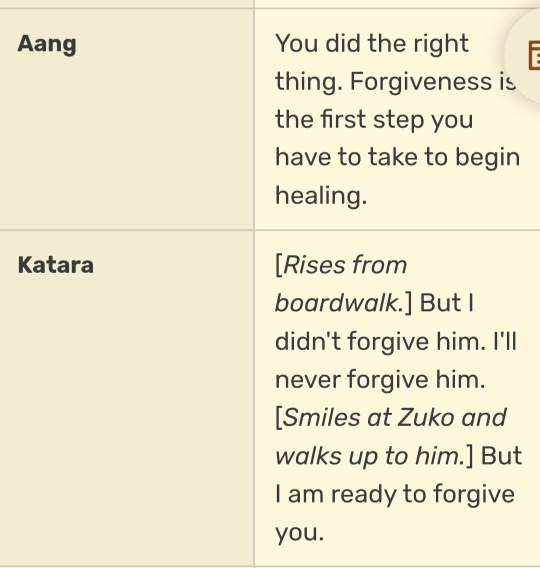
As an aside, I would LOVE to have been a fly on the wall when Zuko told Aang what Katara did before the start of this conversation. What, exactly, did Zuko tell Aang that happened?
We know he must have told Aang that Katara did not kill Yon Rah, but then there's a deliberate choice to have Aang misunderstand what that choice meant. The dialogue did not have to be written this way, and the rest of the episode and series kind of ignores it, but it's still a choice to have Aang not only wrongly assume that Katara sparing Yon Rah means she forgave him, but to have him directly tell her that how he interpreted her actions was the right choice and he's "proud of her."
Aang could have asked her about what happened first, before assuming. Because the effect of having him say he's proud of her before really hearing from her about what happened implies that he is only proud of his version of events, and not hers. Because Katara then directly contradicts his version.
The way the dialogue is written also implies that Aang thinks forgiveness is a necessary step towards healing, so Katara might leave this conversation thinking Aang does not think she has truly healed or taken steps towards healing. Aang makes a lot of assumptions that don't make him look good, especially when Katara is admitting vulnerability to him about what happened. No wonder she chooses to ignore his comments and get her closure with Zuko instead.
It's actually kind of hilarious that the show does this and then acts like it never happened in terms of Aang and Katara's relationship, but then, we still have to remind ourselves that it was a narrative choice. The episode could have been written to affirm Bryke's vision of Aang as the angel on Katara's shoulder, but it wasn't. And it's also hilarious how Zuko comes out looking like the actual guardian angel on Katara's shoulder, the one that is by her side throughout the episode, the one who tells Aang about what she did, the one she actually finds closure with at the end of the episode.
As for the second part of your ask, it's one of the flaws of the way the show frames Katara going after Yon Rah as an unnecessary revenge quest. Imagine if it hadn't actually been framed that way, and instead the episode was written as one of the "monster of the week" episodes that the gaang has been through many times. Imagine the gaang coming across something in a village about the Southern Raiders, and Zuko saying "oh, yeah, I know those guys, they're still active," and the gaang deciding as a group that they need to be stopped.
It's because Katara has personal feelings about Yon Rah and wants to go after him herself that the show frames her actions as out of control and immoral, and I have a problem with that.
It also kind of reeks of a mindset that is actually very American. I've talked before about how this show was written in a post-911 America and how that influenced the writing. Another way is the idea of Aang as the world police. Katara going after Yon Rah herself feels very "don't let the brown victims of violence get justice, let the world police do it." There's this idea that Katara will be corrupted if she gets justice, whereas Aang is an impartial judge of how all peoples should get justice by virtue of being the Avatar. Which is whatever, because it's a fantasy show, but when people act like this line of thinking is above criticism, I do have to give pause.
35 notes
·
View notes
Note
I would actually be really genuinely interested to read your defence of Makorra. I’ve never really been partial to any of the TLOK ships but I know that one gets a lot of hate (even though I don’t see anything wrong with people shipping it) and I’m just curious to see your take.
I've been sitting on this a bit, because it's been a while since I actually sat down and thought about what it is I love so much about Makorra--the fire/water and slap-slap-kiss/BST energy aside--and it reminded me that I actually rewatched the first three episodes of LoK not that long ago (which is when I had my revelation about Equalist Asami, and how I think that the Equalist Mako and Korra fight in episode three was originally meant to be Asami's true introduction to the show, to be revealed when it became clear she and her father were Equalists), because of this meta by @devildogdemon on episode three that reminded me just how much those early episodes made me love Makorra well before the love triangle crashed onto the scene and everything went tits up.
I've spoken before about how what I really loved about Makorra was the potential:
I personally loved Makorra, but I loved it for what it could have been, not what it wound it actually being in the show–but that’s because the love triangle was sloppy as hell and poorly handled, and it took the place of actual bonding for the krew and development of their individual friendships.
This still holds true, and I think the foundations were all very well laid out in the meta that I linked above.
When Mako and Korra had time alone together, and were in a stressful situation, they worked incredibly well together, despite the way their personalities--Mako a bit staid and stoic, used to shoving down his emotions so that he could be the parent his little brother needed and, as a result, never learning how to process how he felt in a healthy manner, while Korra spent her whole life among adults and as a result never really learned how to just be a kid, or how to relate to others her own age, so she is brash and reckless and does what she thinks is necessary because she's never been around people who had to ask permission before they just Did Things and hey, she's the avatar, shouldn't she be the one everyone is looking to for leadership???--tended to clash, especially early on.
They slid almost effortlessly into the Battle Couple trope when it came time to fight--to try and get Bolin back, and to protect one another--and those scenes in Book 1 feel a lot like Zuko and Katara training together at the end of book 3, covering each other's blind spots and accomodating for each other's weaknesses. This is also, incidentally, the episode where Korra winds up wearing Mako's scarf--the one memento he has from his parents, who were killed when he was a child. Sound familiar?
-insert image of katara's necklace around zuko's wrist here-
And before anyone gets on me about the parallels, I'm not saying that Makorra is the same as Zutara (although if you told me that Bryke intended it to be, I'd believe it--either because they thought they were finally giving the shippers what they wanted or, more likely, they wanted to show why they believed zk would never work), but the parallels do exist, and it's largely because Mako occupies the same position within the krew that Katara does within the gaang. They also have the BST and the banter more than any other relationship in the krew, so of course they're going to wind up paralleled to the relationship in the gaang that had the most narrative tension. They are still, at the end of the day, very different relationships, because Mako and Korra are very different people than Zuko and Katara.
But I'm just saying, the symbolism of one half of the pair wearing the other's only physical link to their dead parents........it's there. I didn't make this up.
They also, again like zutara, have this moment of emotional closeness and vulnerability early in the book--in episode 3, where Mako reveals to Korra what happened to his parents and why he had history with the triads, which casts some light on why he acted the way he did in the very first episode (I've seen people getting on Mako's ass about how 'mean' he was to Korra, but like, a) he was very calm about it, and b) how else would you expect someone who lived hand to mouth on the street for an entire decade to react to someone claiming they had 'nothing' in the same breath as admitting that they'd never had to want for anything in their entire life?), and allows them to become closer emotionally--as friends and potentially more, given the explicitly romantic framing of the interaction and several others throughout the episode.
Ultimately, what initially drew me in to Makorra was that slap-slap-kiss/Belligerent Sexual Tension they had in the beginning of book 1, but what really makes me think of what they could have been is the way their relationship developed in episode 3 and the groundwork that was laid for a slow-burn there, rather than Korra deciding she was in love with him just in time for Asami to crash into the scene and nab him first.
(Incidentally, had Asami been an Equalist like she was originally supposed to, this could all have been part of a larger plot and Korra could have slowly come to realize what Mako meant to her while examining the things she felt when she saw him with Asami--meanwhile, all of their relationships could have been given room to breathe and grow, especially if Bolin's puppy crush on Korra were dropped, and Mako and Korra clashing over Korra's suspicions of Asami wouldn't have been quite so ugly if both of them were proven just a little bit right. And then allow for that betrayal to shake the foundations of the krew before Asami works her way back into their good graces, and Mako and Korra don't get together until they've navigated the fallout from that and discovered how much they really mean to each other.)
Uh... yeah, I rambled for days, hopefully I answered your question adequately! I just. I really love Mako, and I really love what he and Korra could have been to each other, and I really love who Korra could have become if the show let her actually grow organically instead of giving her Character Development Through Brutal Torture, and all of that has I guess kind of sunk into a ball of how the show would look if Makorra were done better to me lol.
84 notes
·
View notes
Note
KSIGJICNRJCNEHCBD HELLO HELLO WELCOME TO THE HELL THAT IS KNOWING ZUTARA IS EVERYTHING AND SHOULD HAVE BEEN WRITTEN AS SUCH !!!! wow i love that you are as angry as i was (and am every rewatch? yikes) this is amazing i knew you're my favorite but yeah wow man this really. confirms it whew high five
yeah it’s pretty wild how I knew this was what happened and was already bracing for it and yet STILL got completely misled by the narrative??? MEN I tell you MEN. I’m also going to use this ask as a method to reply to some of the other commentary if you don’t mind since this seems like a good place for communal frustration (here is my original post for anyone scrolling around lost)
@meg-hemmings: I agree with all of ur thoughts and I would TOTALLY read anything you wrote for Zutara … your writing is among my absolute favorite ever and I think you would write the Zutara dynamic so beautifully!
@one-man-propaganda-machine: I am - begging - you to write it yourself.
I... am not going to make promises, but I may have to. I want something very specific and that never bodes well for me. I doubt it would be more than a one-shot, but there are multiple scenes that could have occurred between episodes that would flesh out what was there (and of course I’d cut the final 15 seconds of the show, much like another epilogue I loathe and ignore)
@deifiliaa: omg atla discourse in 2021; olivie, i’d love to see what your character tier list looks like now that you’ve finished the series 👀
I’m going to put azula at the top. not because she’s a good person obviously but she’s FULL. OF. HITS. every time she’s on the screen the narrative gets immediately more interesting. she’s savvy and self-assured and I love it. her ending depressed me although I like that it was kind of about the loss of her two best friends? if that had been more of a focus I think I would have enjoyed it more but yeah, losing mai and ty lee could have been rightfully devastating. who among us is not totally obliterated by friend breakups. I also really loved uncle iroh; if anything that’s why I wasn’t invested in zuko’s storyline until close to the end, because watching him disappoint his uncle was very difficult (I get it, he’s a teenager, he’s growing and evolving and whatnot, but also I am closer to being his uncle than to being him so like, yeah). I also hope the peter pan revenge guy (JET that’s his name, sorry pregnancy kills my brain cells) did hook up with both katara and zuko. I love that journey for all three of them. I wanted more time with mai than we got, so there wasn’t quite enough there to love... but I was very down with ty lee interfering on her behalf. what a pivotal moment
of the core characters I think I was quickest to love sokka; the episode where he apologizes to suki and asks her to train him cemented it for me. I think it’s a big deal to show boys apologizing on-screen and owning their misconceptions. I like katara a lot—she’s what a lot of people do with fanon hermione. toph is also great, and part of me feels there is a strong basis for a ship with aang that balances their opposing energy, though I also like the idea of them being platonic besties. aang is... twelve. pretty much every time he was on the screen mr blake (a teacher) was like “man, aang is such a seventh grader,” so it was nice how convincing that was for his emotional journey, but at the same time it was hard to forget he was in seventh grade. appa and momo are STARS. I am sure I have mentioned this before but mr blake really loves animals and he was devastated by appa’s kidnapping; he hugged our dog for about ten minutes after aang found appa. after he decided I was zuko, he speculated that he is closest to aang but he’s not happy about it lol. “ugh, aang and I are such boring pacifists” was I believe his take on the subject
@libbynico, who for some reason I can’t tag: so true! katara was literally something like a mother/older sister figure to aang the entire time, but whatever
yeah, I think it really sucks that katara, as the emotionally nurturing character, felt shoved into the role of love interest. it’s everything wrong with the distribution of emotional labor in male-female relationships but sure, WHATEVER, apparently nobody thought to ask me in 2008
@touslesnoms: I liked “such selfish prayers” by andromeda3116 if you ever decide to read zutara after the series; the worst prisoner by emletish is super funny too
thanks for the recs! I will take them. I do want something very specific so I will be accepting recs until I find it lol. or until I lose composure and write it (yeah this is me WITH my composure, no wonder mr blake thinks I’m zuko, “I’m never happy” indeed)
@gaeleria: THANK YOU!!! Ugh omg that “I’m confused” kiss scene made me actively hate the ending. I knew ahead of time they were endgame, so I tried to make myself accept it early on. Like, I really didn’t like the pairing, but I wasn’t going to be emotionally invested in the romance and it was just going to be like, whatevs. AND THEN THEY WROTE THAT SCENE??! 1000% no. What was even the point of that scene? If they had written it to make Aang have some introspection and realize it’s not all about him, Katara’s feelings matter too, or even apologize, or anything… but no, there was literally no point to that scene. No character growth, it was never mentioned again. Ugh.
this is in answer to both you and beloved @zabbini: yeah this was a fuck-up for sure lol. I think it may come down to editing for time; the series is very irregularly paced, what with the majority of the action taking place in the final three episodes of a 16 episode season. or maybe it’s just because MEN CAN’T BE TRUSTED TO WRITE ROMANCE but either way yeah this was a real misstep and just truly, truly reeked of a particular (white) male attitude about how women think and what they owe. had a bad day, dudes? buy a gun, kiss your forever girl, do whatever you want and it’s fine! (I’m exaggerating but barely)
in terms of what’s so angering for me: a character like katara who previously had tons of agency was robbed of it when it came to her romantic arc, which is just really upsetting. and to be fair, I was equally upset when zuko instantly agreed to the agni kai with azula because it was like okay well katara’s extremely valuable, as you know, but now you want her to just sit on the sidelines...? (more of a story flaw than a relationship flaw, but my chest sunk a little at the idea that katara was going to sit by and watch as an accessory to zuko’s story when she’s a crucial weapon in their collective fight. what a waste, right?)
it’s also especially hard to buy into the aang thing when zuko’s method of problem-solving on katara’s behalf is there for comparison. he asks her what she needs in order to find closure and then from there, does everything necessary to get it without having to be asked twice. versus aang, who is a twelve-year-old pair of rogue lips who never wins any of his fights without the aid of phenomenal cosmic powers...? ugh I’m getting off track but in the end there’s just a complete lack of understanding what female audiences want, though again, I don’t think they were really considering that at all. which I guess is... fair, it’s not the point of the show, but then why make the ending romantic at all? to show that their brand of hero gets everything he wants, I guess
in conclusion in 2008 I’m not sure the industry was capable of doing better, which sucks but isn’t surprising. still, it does fit the components of “stuff I write fics for,” which is I enjoyed most of it but find myself enraged by slivers I compulsively need to fix—WHICH IS STILL NOT A PROMISE but ugh I can already feel myself giving in
26 notes
·
View notes
Text
The Crossroads of Destiny Alt. Ending
I’ve been thinking about Zuko’s decision during The Crossroads of Destiny a lot and I had to write my thoughts down. Like many of you, I was heartbroken the first time I watched this episode and wished fervently that he’d made the opposite choice. In later years, I realized that it was absolutely necessary, from both a character and a narrative perspective, for Zuko to go back to the Fire Nation as it’s Prince in order for him to be able to realize how much he’d changed during his travels and how his father’s love and acceptance wasn’t something his current self needed.
I told myself that during his “metamorphosis” Zuko had only realized that capturing the Avatar, besides being dangerous and impractical, wasn’t going to earn him his father’s love, and so he should learn to be happy with what he already had (namely Uncle Iroh and a peaceful uncomplicated life).
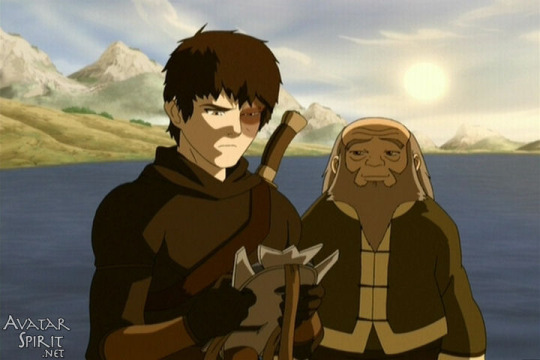
I reckoned that Zuko hadn’t given up on his desire for his father’s regard, just on ever obtaining it, and so he had to make the wrong choice in order to be confronted with the truth: that he shouldn’t have had to try so hard to earn his father’s love, that having it wasn’t all that great in the first place, that what he thought would make him happy wasn’t necessarily what really would make him happy, that he wasn’t to blame for the Agni Kai incident, that he had a better father figure in Iroh, and that what the Fire Nation had been telling him all his life about the war was completely wrong.
Looking at it in that light, it made perfect sense for Zuko, who still wished for nothing more than to be accepted by his family, to decide to side with them against the Gaang.
However, the more I think about it, the more I realize that there’s something fundamentally wrong with Zuko’s choice even if you take all of the previous into account, coming down mainly to these 2 things:
1) Zuko shouldn’t have trusted Azula AT ALL, especially after what she did to him during The Avatar State. How did he ever trust that Azula would keep her word and not just dump him in a dungeon somewhere as soon as her objective was complete? She had literally given him no indication ever that she was trustworthy, and he trusted her anyway! C’mon Zuko you’re smarter than this! At least think about it for a moment!
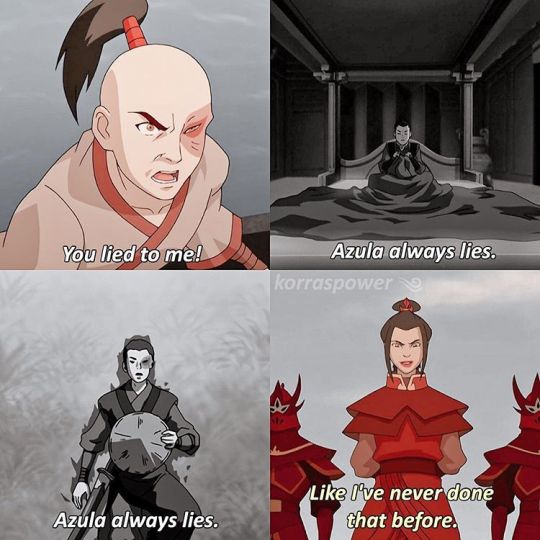
2) It goes against everything we know about Zuko up until this point for him to betray Uncle Iroh. After realizing how lost he was without him during Zuko Alone (and confirming it to the audience during The Serpent’s Pass),

after nearly losing him to Azula’s attack during The Chase (just look at the poor boy’s face jesus),
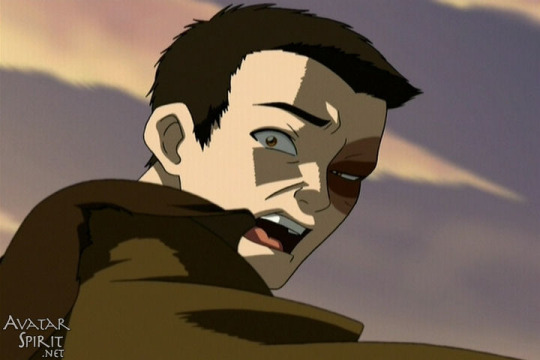
after learning to chase his own happiness and cherish the bond he had with him during The Guru,

after all of that, you’re going to tell me that Zuko would leave Uncle behind?? And not even try to free him from the crystals?? I don’t buy it
So this is my proposal (it’s not perfect so be kind please I’m doing my best with what I’ve got because Zuko HAS to go back to the Fire Nation, AND it has to be as a Prince instead of a prisoner, AND he has to genuinely desire to go back so that we can watch his growth as a person, AND he has to not betray his Uncle). I think it should’ve gone something like this:
Let’s start by giving Zuko better motivation for his betrayal than just “I want dad to accept me���; Azula’s speech to lure Zuko to her side would stay much the same, except she’d place extra emphasis on how she knows he’d NEVER betray his father and his sister over the Avatar, their greatest enemy, and how she’s sure he’d never turn his back on their people, who are counting on them to end the war once and for all in order for their soldiers to return home.
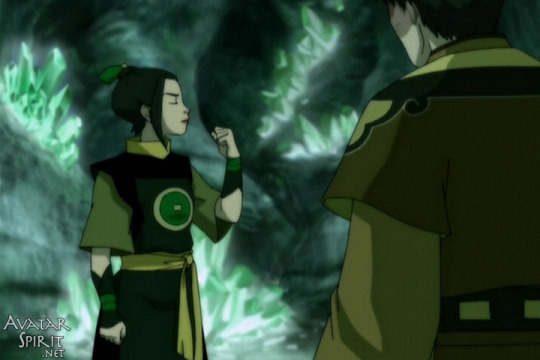
After she leaves them alone, Uncle Iroh would still plead with Zuko but instead of just a shot of his back we’d see how Zuko, full of regret, tells him that he’s sorry but he just can’t. Iroh would beg him to reconsider, to think for a moment, to remember that Azula had promised him love and greatness before and they both knew how that had gone down. Zuko would say that he knows, but even so he can’t bring himself to betray both his nation and his family, and that if there’s even the slimmest chance that his father would take him back and come to love him he has to try.
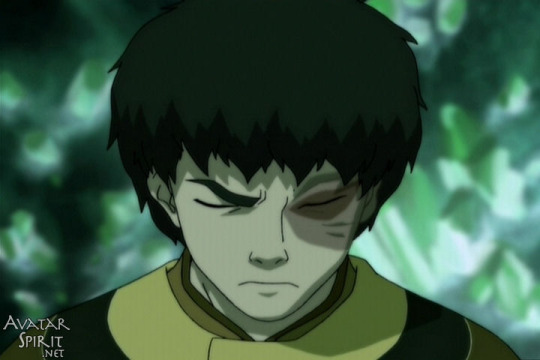
Zuko would then free Iroh from the crystals and, almost in tears, beg him to run, to go back to Pao’s tea shop in the Lower Ring and lay low for a while. Azula would have to leave Ba Sing Se soon to deliver her prisoner to the Fire Lord after all, and once she’s gone it’s unlikely they’d ever find him so he should be safe to resume his peaceful life in the city, even with it under Fire Nation control. Zuko would then push Iroh towards the exit of the catacombs, yelling at him to leave, please. He needs him to be safe. Iroh would be disappointed and agree on the surface, but of course he’d only hide himself to find the opportune moment to aid the Avatar. Once he’s out of sight Zuko would take a deep breath and follow Azula.
In this way, the “I have changed” line during his fight with Katara would actually mean something, since he is not only doing this for himself, but also for the Fire Nation as a whole, despite not really wanting to hurt this girl he empathized with mere minutes ago or this literal child that happens to be the Avatar. He’d be very conflicted about it, but ultimately decide his people HAD to come first.
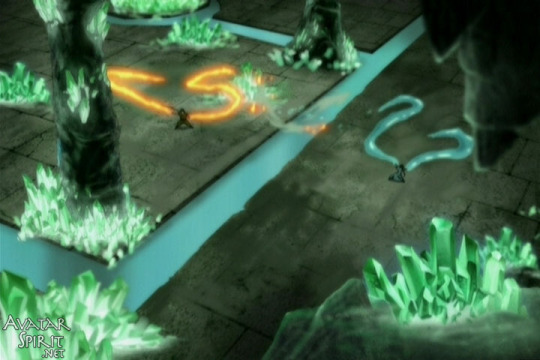
Of course, he’d be horrified when, instead of capturing the Avatar like he’d imagined they would, Azula strikes him down with lightning (and we’d actually get to SEE HIS FACE when it happens this time).
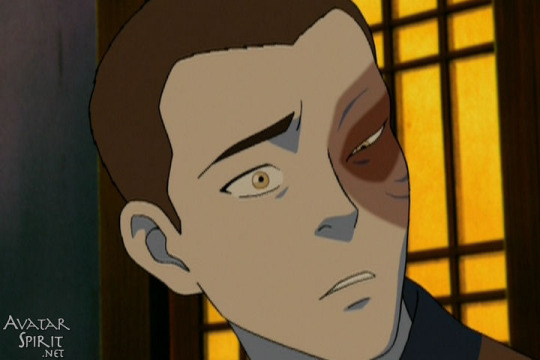
(maybe something like this; the only other time we see Zuko reacting to violence from the Fire Nation onto an innocent person, but more pronounced because he actually kinda knows this kid and his friends. Song was a stranger)
The rest would play out just like in canon, with Uncle coming in to save the Gaang and being captured, and Katara fleeing with Aang.
Azula’s later speech to “cheer up” Zuko would again stay quite similar, except maybe she’d add a few lines about how he’d brought glory to his nation, his people would be proud to call him their prince, etc. Against all odds Azula keeps her word, which would make Zuko a bit wary, but of course it’s only because just in case the Avatar survived she now has a scapegoat ready to take the blame.
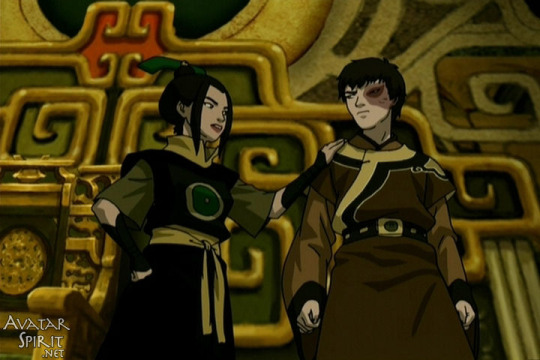
Zuko would still feel like he betrayed Uncle since his choice got him captured and the Avatar “killed”, but still he would’ve understood that trying to free him would’ve only gotten them both caught and thrown in prison. He would’ve figured he could help him more from a position of power in the Fire Nation, but would’ve still felt guilty for not attempting it.
This Zuko would also lie to Azula about the Spirit Water unambiguously both because of his guilt over getting the kid hurt and his desire to keep his father’s regard. Unlike canon Zuko, whom some argue did it only for the latter reason.
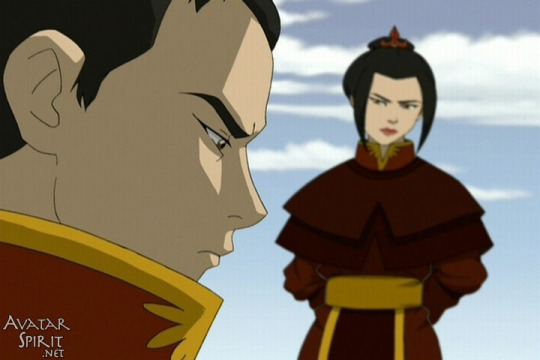
Once in the Fire Nation, we’d see the same journey of Zuko realizing that even if they win the war it’s doing nothing but twist his people by telling them lies, taking their resources and their family members, and feeding their hatred instead of their passions. I also feel like this would be more in tune with everything we saw of Zuko’s character during Book 2, with more taciturn reflection and regret and less yelling at Uncle for no reason other than take his frustrations out on him. Maybe he’d yell a bit about how he’d told Uncle to leave, why didn’t he?? Also maybe he’d try more seriously to convince Uncle (and himself) that he’d done what was best for their nation, and that Iroh should beg for forgiveness so that maybe they’ll let him out of prison, he’d talk to his father for him, he’d back him up, come on, “why aren’t you saying anything?? Uncle please talk to me!!!”.
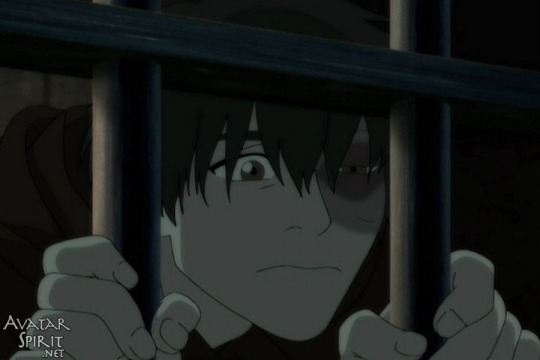
For extra angst Uncle would stay the same as in canon, not talking to Zuko in hopes that he’d realize he’d lost his way on his own.
#atla#the crossroads of destiny#Avatar The Last Airbender#meta#thyf rambles#Zuko#uncle iroh#Azula#katara#aang#zuko is the best boi#my drabbles#kinda#atla meta
26 notes
·
View notes
Text
The three redemptions of the Fire Nation
I am completely pumped by the Ehasz interview about Azula‘s redemption arc. Maybe because I have been writing her lately in a post-series AU, and being in her head and thinking about her, I realized again how pissed off I was with the arc (if you can call that an arc) they gave her in the comics and how horribly her relationship with Zuko is portrayed. I just feel that if we got a Book 4, a lot of the emotional energy would have gravitated to the relationship between Zuko and Azula - there was so much left to unpack there.
I was really glad to see Ehasz mention specifically Iroh. I’ve read countless metas on how Iroh didn’t do right by Azula (and maybe there would have been something he could have done, I’m not sure), but to me it is more significant how the ripple effects work.
Sozin’s twisted evil rippled through the Fire Nation and the Royal family, leading to Azulon being an abusive father, to Iroh and Ozai having a terrible relationship, to Azulon’s and Lu Ten’s death, to Ursa’s and Zuko’s banishment and the almost complete disintegration of the family, symbolized by Zuko’s and Azula’s final, tragic Agni Kai on the day of the comet’s return. It’s a narrative of fear and violence passed down through generations, but also fits in with Sozin’s basic assumption that he can spread greatness by violence and oppression.
But Iroh losing Lu Ten and his redemption of rejecting violence is starting to weave slowly an opposite narrative within the family. Iroh’s redemption arc basically turns into loving Zuko through his worst and believing in him, putting him on a path of redemption, and generally playing a large part in Zuko becoming the kind of person, we see at the end of Book 3. This redeemed Zuko can then use his own experience to help Azula find her way.
For Zuko, it would give the final piece of his redemption to be the one who forgives and gives Azula a chance, simply because he’s been there and he knows the way out. It could also complete his arc about his family which was his greatest motivation in Book 1. He will never get back the family he lost, but maybe he still has a family that can be saved.

As for Azula’s path, her story had three important themes:
Love v. fear: she saw love as a weakness, something that makes people vulnerable and irrational, so she pushed it away, and chose fear and calculation like Ozai. She tries to control Mai and Ty Lee through fear, but in the end they still betray her out of love. She still doesn’t see the strength of love, she sees it as proof that she has to make people fear her more. And this conflict culminates in the Agni kai, where she threatens Katara’s life, and Zuko chooses love over winning, even over his own life, and Katara also keeps fighting out of love, no matter the odds. In the end Azula still loses, despite almost having killed her brother (it really affects her, she truly falls apart the moment he goes down). Obviously, it would be a challenge for Azula to let love in, but she would need to experience personally the strength that comes from love, from making those kinds of choices.
People choosing Zuko: that’s another huge part of who she is. No matter that she’s smarter, that she’s a prodigy, that she’s perfect, she feels like people keep choosing Zuko over her. Their mother, Iroh, Mai, Ty Lee... I think this is one of the places where they could start - a situation where Zuko chooses Azula, when he has nothing to gain from it and everything to lose. Where he makes the irrational, reckless type of choice the others made for him.
Born lucky: Azula’s self definition is so centered around being perfect, being better than Zuko. It stems from her own competitive streak which was reinforced by Ozai. She wants to win, and always does, so she has no idea how to deal with failure. While Zuko also started out constantly comparing himself to Azula, he gradually realized that he has to focus on himself, on his own strengths and be better than he was before. His arc is more and more about fighting and winning over himself. Once Zuko became Fire Lord, Azula would have to let go of the idea of measuring her own worth against him (I think this would be a huge challenge for her, and this is where her redemption would keep stumbling), and start to focus inwards to figure out who she is. Kind of an “Azula Alone” storyline, where she would have to redefine herself by something other than perfection, or winning. She would need to realize what drives her, what she is really fighting for. This is what I find tricky, to figure out what motivates post-series Azula. One of her strongest motivations is her absolute loyalty to the Fire Nation, and her strong identity tied to it. I think out of all three of them, Azula is the most quintessential Fire Nation.
Clearly, the redemption arcs of Iroh and Zuko are tied to the redemption of the Fire Nation as whole:
- Iroh’s arc plants the seeds of doubt, whether they have lost their way and whether the war is necessary;
- Zuko’s arc leads the Fire Nation to face itself, and choose to come back to the balance, and make amends.
But of course, for a lot of people, the loss of an empire would be traumatic, they would feel their pride hurt (this is where the opposition to Zuko comes from), and so I think this is where Azula could come in; her arc could be tied to the Fire Nation redefining itself in a post-war era in a positive way, so they can regain their sense of self, but not driven by an ideology of winning and superiority, but born out of a true sense of pride built on talent and hard work, but also a healthy dose of humility.
#atla#atla meta#azula#redemption arc#zuko#zuko & azula#zuko & iroh#iroh & azula#fire nation royals#fire siblings#sozin#azulon#ozai#aaron ehasz#book 4 theories#rtk#long ramble#sorry#azula redemption
655 notes
·
View notes
Text
Some thoughts on romance in TDP and ATLA: What Does Rayllum Get Right?
Okay, I know this post doesn’t do much service to this claim, but I don’t love the idea of directly comparing ships to one another. Every relationship is different in the context it takes place, and it’s just as unfair to directly compare any two relationships as it would be to compare two different couples in real life: every person, and by extension, every character, is unique in their own way. Not to mention I’m a bit hesitant to write this because TDP just found its footsteps away from ATLA with the new season, and I honestly fear plaguing the lovely positivity of the TDP fan base with old wounds from the ATLA ship wars.
BUT since there are already a lot of popular Kataang/Rayllum comparison posts floating around, I feel the need to share my two cents on the bit as someone who wholeheartedly enjoys the trajectory of Rayllum, but had my... reservations when it came to the canonized romance in ATLA.
Instead of dwelling on those reservations, though, I’m gonna focus on talking about and validating the parts of the ships we do like (meaning both Zutarians and Kataangers).
This essay, in a nutshell:
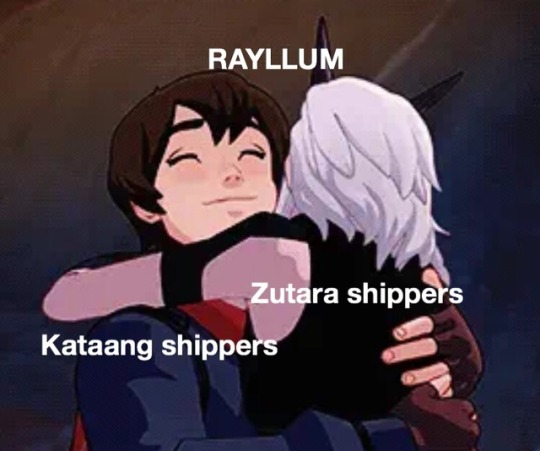
Two ships form an unlikely bond and find their peace in the midst of warring kingdoms fandoms. #amirite
What Rayllum Learns from Zutara
TBQH I surprised by how many embraced the Kataang/Rayllum parallels because the setup itself reminded me of Zutara— not Kataang. They share a similar origin story: Rayla threatens Callum in an attempt to pursue his little brother, just like how Zuko often pursued Katara to capture Aang. Their introductions are antagonistic, if not explicitly violent, but because the writers take the time to humanize both characters outside of these interactions, the audience understands that these conflicts happen because they’re driven by motivations from opposite sides of the war. Of course, when they are forced to become allies, it’s... not as smooth-sailing as you’d expect.
At its core, both Rayllum and Zutara are very cautious friendships. They don’t trust each other right away. It’s not perfect; they have their outbursts, reluctance to trust, and painful blows to their bond. But against all odds they eventually establish trust in each other. And because that trust isn’t just given, but needs earning, it takes its time dwelling on wounds necessary to transgress those lines and establishes extra depth in the meantime, making it well-earned and conducive to an understanding relationship. When they find their peace and friendship, it feels earned and respected on both sides, and both parties have a deeper understanding of each other than they could've had with a happy-go-lucky friendship.
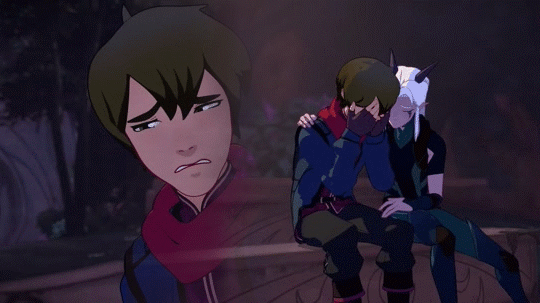
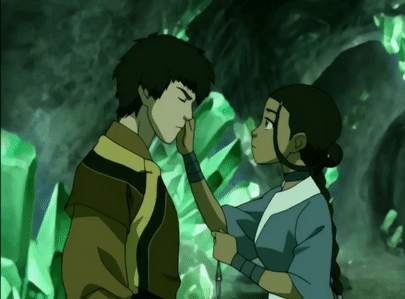
Also, a side effect of the bitter work (sorry I had to lol) it took to to build that relationship, both Zutara and Rayllum have become especially in-tune with each other’s emotional cues. On the behalf of Zutara, there’s the moment when Katara comforts Zuko as he’s cowering in front of his uncle’s tent. She immediately recognizes that something’s wrong and approaches him about it:
Zuko opened up to Katara yet again about his insecurities and fears just like he did in Ba Sing Se. I love how easy it is for him. Zuko’s normally so guarded yet doesn’t mind being vulnerable with Katara. He’s so worried because he doesn’t see how Uncle Iroh can forgive him. It’s important that Katara’s the one encouraging him because she was also someone he betrayed that day. Someone who had faith in him to make the right choice, someone who changed for the better. She forgave him and she knows Iroh will too. That carries some weight with him.
-- Geektastic08
Because of how many more opportunities Rayllum than Zutara to show off their perceptiveness of each others’ emotions, I could name off a lot of similar moments-- but I’m going to go with when Rayla slices open the mummy on the Cursed Caldera. When she returns and anxiously gets to ushering people forward, Callum notices almost instantly that Rayla’s acting off and expresses his concern. And, of course, Rayla opens up that she did, indeed, see something “horrible”— immediately opening up to him on the fact she was afraid, almost instinctively overcoming her reluctance to show her fears and weaknesses as established from previous episodes when Callum is the one who asks about it.
Also, this:
"I know that face. It’s your dumb idea face.” =)
Another reason: balanced-out co-parenting is a thing (Ezran vs. the rest of the Gaang).
On a more grand-scheme note, their relationship actually also shares a lot of the same “thematic importance” as Zutara as a symbol of overcoming differences and bonding. As cheesy as this line low-key is (IMO), Harrow says:
“I ask you and your brother to reject history as a narrative of strength and instead have faith that it can be a narrative of love.”
Yeah, read by the human boy crossing foreign lands with a she-elf to return the Dragon Prince to his mother as a gesture of bonding elves and humans and ending the war between nations. Having faith that history can be rewritten as a narrative of love and compassion.
To top it off, Rayllum owns it when it comes to living up to the not-overtly-kissy romantic foreshadowing of Zutara.

This is an allusion to the established Moon symbolism from earlier in the episode. As painful as it was, finding out about the king winds up illuminating, and eventually fulfilling, the possibility of deeper relationship and understanding of trust they originally couldn't see (but was still there) when Callum crosses the barrier into the “light face” from the “dark, shadowed side”.
Also, this shipper’s haven scene:
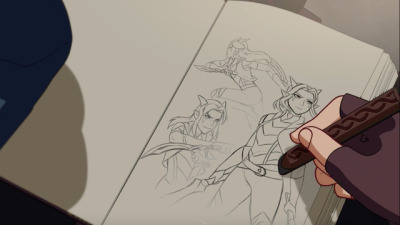
Agh, yes.
What Rayllum learns from Kataang
Okay, so one of the bigger (and very understandable) issues with Zutara is that all of their development (aside from “Crossroads of Destiny”) happens very late in the last season. No matter how solid the moments we do get are, there simply isn’t enough time to fully wash away their damaged terms only a couple episodes prior, much less transgress necessary lines before a healthy relationship can occur. Whether or not their build-up does justice for their relationship arc as friends, by the end of ATLA, Zutara’s negative interactions still outnumber their positive ones by a sheer majority, so pushing that relationship into romance so soon comes with negative implications. (Which is where the Book 4 rumors seep in, but let’s not touch those today)(Anyway, even as a person who generally supports Zutara, I don’t advocate for that relationship to be “endgame”, or even as a part of canonized material because romance that soon after establishing that trust wouldn’t have conducive to a healthy relationship.)
On the other hand, Kataang gets a lot more credit in the time department. Because their friendship is established in such a positive light from the very first episode, Kataang has the benefit of faith from their countless endearing moments capturing a casual, comfortable friendship we can know and love, and then can grow nostalgic about over time. Even when their angrier moments play out, they usually fizzle out in the pool of happier memories they already have, so such instances are easily forgivable from the majority of the audience.
Now, despite initially being at odds with each other, Rayllum is established early enough to have the advantage of 5/6/7 seasons under its belt to build to that healthy relationship. Even in the less-immediate circumstances of their trust, the show still leaves plenty of time to fill with the necessary builds and prove their friendship through positive interactions. This is evidenced by the fact that by the end of Season 2, their negative interactions— even Rayla’s original position as Callum/Ezran’s killer— is water long down the bridge.
(Random tangent: To all who believe Zutara is an unforgivably abusive ship because of Katara’s and Zuko’s previous enemy relationship, let me pitch this to you: Rayla literally corners Callum and holds a blade in his face, about to kill him in the second episode yet Rayllum is very inarguably not abusive. The issue with Zutara isn’t that it’s inherently a sour relationship because they used to be enemies, it’s that there’s a dire lack of time to ease the ratio of interactions of Zuko hurting Katara to him helping her before the end of the show where starting that immediate relationship would have come with poor implications. In the case of Rayllum, Rayla actually gets a very extended chance to make that up in a larger span of time and exceeded those numbers two weeks ago long ago)
Thanks to all that screentime, maybe if our Season-2-Shipper-Scenes can be read as glimpses of a possible building crush early on like Kataang’s, that’ll stir up some of the heartstring garble later that it did with Kataang, too (for some, at least).
Rayllum’s interactions share the lovable silliness of Kataang. When it comes to picturing your ideal, sugarcane relationship, we will often find our soft spots in the couples who spend the most time smiling, laughing or being casually friendly with each other.

Also, here’s an interesting parallel: Katara was Aang’s primary support through his loss, just like Rayla was for Callum. Also, both Katara and Rayla struggled to hide the fact from their “romantic counterparts” at first, in fear of hurting newfound friendships with people they cared about, only to have this backfire later. However, I’d say it’s interesting to note that because Callum is almost 3 years older than Aang and thus arguably in a different phase of maturity (older childhood at 12 vs. teen at almost 15), the way they processed that realization took remarkably different forms between the two characters. Breaking the news to Callum meant surfacing more relationship-based questions about trust, meeting its resolution in a heart-to-heart conversation about honesty and hurting people you care about. On the other hand, because Aang is still, for most purposes, a child, that recognition on Aang’s part, as well as the honesty/lack of censorship on Katara’s part, doesn’t exist as much as an expectation in that relationship. Consequently, Aang’s grief process in “The Southern Air Temple” was wholly Aang-centric, coming to life in a display of rage and pain before he comes to accept his new position as the avatar and the last airbender in the arms of his new “family”. (I actually think the most obvious comparison to Aang here is Ezran, who became angry and ran away when he found out about his father’s death, then returned with a fuller understanding of the newfound individual responsibility he must face despite not being ready for as a growing kiddo. But that’s a discussion for another time; maybe I’ll write something on that later).
Of course, the aforementioned covert foreshadowing of the Zutara ship comes coupled (pun intended) with the overt romantic foreshadowing of the Kataang ship! Because what kid (or kid in the heart) doesn’t let out the giddy squeals over that.
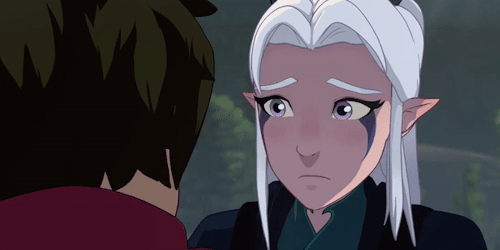
Also, it’s the male and female lead. Everyone’s gotta love those characters! Bet you money all the 2010s children who watch TDP are gonna get hella attached to that stuff and rack up the tears on how well-elaborated those characters were and how perfect they were for each other through thick-lens nostalgia goggles when they grow up. That’s just how dat shit works.
TL;DR If Zutara was too “dark” or “intriguing”, or “bound to make six year olds cry” (as Ehasz himself supposedly said in a class at UC Berkeley; lol), Rayllum re-illustrates that arc with the cushiness of a clear, lovable path and the positive-interaction-to-death-threat ratio, audience faith, (love for small critters,) and longer friendship screentime of Kataang.
Rayllum shares all of the literary nuances of Zutara and the sweet lovability of Kataang. And then adds its own little sparks of healthiness.
It’s a ship built for everyone to fall in love with.
I honestly don’t care whether this winds up being a very strong friendship or a romantic relationship (though I’m inclined to believe from the narrative that it’s the latter), but no matter the direction the show takes, I love their relationship so much and have full faith it’ll be done right.
Let me know if I missed anything else! I know I might be missing the narrative importance and/or parallels others might see in Kataang because I’m a bit biased to Zutara as the poster of this multi-ship analysis (though I tried my best to counteract it for objectivity), so especially if you’re a Kataanger, let me know what you’ve noticed and I’ll be happy to add it in.
positive/non-warring reax only please :)
502 notes
·
View notes
Text
Thursday Thoughts: Avatar: The Last Airbender, Coming-of-Age Stories, and Where The Heck Are The Adults In This World
Recently, I finally watched all sixty-one episodes of Avatar: The Last Airbender (ATLA) - a show that literally every friend I’ve ever had has been surprised to learn I never watched as a kid.
(Returning readers will already know that I never watched most TV shows as a kid. I’m making up for lost time now.)
Overall, I enjoyed ATLA. It’s an emotional adventure with complex morals and strong positive themes like the power of friendship and family. I had a lot of fun finally discovering the contexts for all the memes I’ve become familiar with because of Tumblr (like “Sparky Sparky Boom Man” and “That’s rough, buddy”).
But I also felt uncomfortable while watching, for one specific reason: how young everyone is.
Aang is twelve years old. So is Toph. The other protagonists, and several major antagonists, aren’t much older. It hit me in the middle of the second episode that I was watching kids play at war – a thought that I know wouldn’t have occurred to me if I had been watching as a twelve-year-old myself, but one that stuck with me for the rest of my watch-through. ATLA is a story about kids in a world of absent or incompetent adults, with the fate of the world in their hands. And that kind of weight just plain doesn’t belong on the shoulders of twelve-year-olds.
The show makes some ventures towards confronting the topic of the kids’ age, and how circumstances have forced them into adult roles far too soon.
Aang was taken away from childhood play because of his destiny as the Avatar and the monks’ fear of the impending war.
Sokka and Katara’s mother died when they were little, leaving Katara as the only “mother” Sokka can remember. Their father left to fight the war after that, leaving Sokka as the only “man” of their village.
Zuko’s father treated him not as a preteen son, but as an adult inferior, and physically tortured him in public over a perceived slight.
The show points at these situations as unfortunate, and in Zuko’s case outright states that it was wrong. But then it keeps going, as all stories about child heroes do, and shows that it’s necessary for the kids to save the world. It’s unfortunate that Aang and Zuko and the others were taken out of childhood so soon, but even when they do go to adults for help, they are turned away and told that only they can solve the problems. It is their plot-driven destiny to be adults before their time.
ATLA also gives us a supporting cast of children whose too-adult qualities are portrayed in a completely uncomplicated, even praiseworthy way.
Suki and the Kyoshi Warriors, Princess Yue, and Jett and his Freedom Fighters all are treated by the narrative as though in being responsible “adult” figures they are as they should be, even though none of them could possibly be older than fifteen.
Toph’s entire character arc revolves around her hatred at being treated like a child by her overbearing parents, and the narrative unquestioningly supports her – the only moment in which it seems her parents might actually support her (the letter from her mother) turns out to be a lie, and leads to Toph achieving her destiny as the world’s first metal-bender. There is no middle ground, and we never actually see or hear from her parents again.
And the villainous Azula, though she displayed a frightening level of competence in every other episode of the show, is finally defeated when she starts behaving in an age-appropriate childlike way. I might be reading too much into this (I am an English major, after all), but the four-episode finale arc left me with the impression that the show was condemning childhood. When push comes to shove, no matter how old you are, you better grow up, or else.
To be fair, this is a coming-of-age story. Naturally it’s pro-adulting. Also, twelve-or-so is the normal sort of age for these stories. That’s when Gregor enters the Underland in Suzanne Collins’s Gregor the Overlander, and when Lyra and Will’s daemons settle in Philip Pullman’s The Amber Spyglass
For a twelve-or-so-year-old reader, as I once was for both these books, it feels perfectly natural. As Neil Gaiman said about his book Coraline:
Reading audience number one is adults. Adults completely love it and they tell me it gave them nightmares. They found it really scary and disturbing, and they're not sure it's a good book for kids, but they loved it. Reading audience number two are kids who read it as an adventure and they love it. They don't get nightmares, and they don't find it scary. I think part of that is that kids don't realize how much trouble Coraline is in -- she is in big trouble -- and adults read it and think, “I know how much trouble you're in.”
A kid reading these coming-of-age stories sees “someone like me saving the world” and goes along with it, not having the external perspective necessary to stress about whether or not the child hero will be able to save the world.
But me? I’m twenty-three. I’m too old to see Aang and company as “someone like me.” I don’t connect with Katara or Toph nearly as much as connect to Uncle Iroh, the closest thing this story has to a constant responsible adult figure. I look at the child heroes and I think, “Where the heck are the adults in this world?”
The adults are gone, as is necessary for the plot. In order for a “kids save the world” story to take place, the adults must be absent or otherwise incompetent, as nearly all the adults in ATLA are. They’re dead, or they’re off fighting another part of the war in a distant land, or they don’t understand their children, or they’re just plain stupid. It puts me in mind of the make-believe games the next-door-neighbor children I babysat in high school would create: in those stories, their parents were always dead.
In her book Good Girls and Wicked Witches: Changing Representations of Women in Disney's Feature Animation, 1937-2001, Amy Davis examines the tendency of parents in Disney films and other fairy-tale kinds of stories to be either absent or otherwise unable to protect their children. This lack of adult guidance is what creates the circumstances for those children to go on an adventure. Grown-ups can’t solve the world’s problems, so kids must step up and solve it.
Or rather, the kids must step up and be grown-ups, and solve it.
But take it from a twenty-three-year-old: a twelve-ish-year-old is not a grown-up, no matter what they’ve been through.
When I was sixteen, it suddenly hit me that it’s ridiculous that Lyra and Will’s daemons settle at age thirteen. Settling indicates that their personality is done changing, that they are who they are and they’ve finished growing up. But at sixteen, I could tell that I wasn't the same person that I had been at thirteen. At twenty, I wasn’t the same person that I had been at sixteen. I’m different again now, though less dramatically. I’m still figuring things out, and there are still adulting steps that I haven’t yet taken, but I’m much more a grown-up than I’d ever have called myself at thirteen.
I can see the value in “kids act like grown-ups and save the world” stories. They’re not written for me, who’s beginning to find them troubling. They’re written for kids, who don’t find them troubled, because they don’t see the dangers that the child-heroes face. They see that the child-heroes succeed.
My mother doesn’t like The Lion King because it’s about a child being told his father’s death is all his fault. She told me so when I was little, and my response was that it’s okay, because we know Scar is lying and that Simba will defeat him in the end. I’m closer now to my mother’s perspective than to my younger self’s response in regards to how I watch ATLA.
We do need to tell kids that they can and will grow up to do great things, and the best way to do that is to show them people their age that they can relate to doing great things – even if it makes adults feel uncomfortable. While the adult behavior of the children might be unrealistic, the ideal that it encourages in them, to become people who save the world, is absolutely realistic.
ATLA is not a story intended for me, though it might have been if I’d watched it then. I’m content to recommend it to children Aang’s age, and to derive an entirely different kind of enjoyment from it by over-analyzing, critiquing, and otherwise completely picking it apart. As I said, I am an English major, after all.
By the way, I highly recommend Amy Davis’s book. It was an instrumental piece of my thesis research and a super interesting read.
Come back every week for a new Thursday Thoughts!
Got a suggestion for a topic? Send it my way!
Like what you read? Consider tipping the writer!
2 notes
·
View notes
Text
It could've been such a great catharsis episode! But the end where Aang gets to be right is a letdown. I felt Sokka was OOC too bc he's not a vindictive kind of guy so it makes sense he wouldn't need that trip the way Katara needed it, but he understands his sister pretty well. He should've known this was something she would want to do. In terms of narrative this could've been a great way to show that even though we all have different ways of dealing with anger and even if our anger is justified there's a path toward resolution that doesn't need to involve more violence. Katara exorcises her anger at first using her bending (and bloodbending) before she realizes it's just not worth it. AND it could be a great lesson on how we don't have to forgive someone who hurt us. Personally I don't think I would ever forgive someone who killed a family member of mine, and that's fine! It's understandable! I don't think Zuko would ever forgive Ozai, which is also really understandable! Forgiveness is not the terminus of our anger; it's a completely separate thing that isn't necessary for our own healing. Katara should've talked with Aang about that, and how if he needs to grant forgiveness to be at peace that's fine, but that's not what Katara needs. She never needed or wanted to forgive Yon Rha. Just like Zuko never needs to forgive Ozai. I would actually really like to hear Aang try to convince Zuko to forgive his father because that conversation would not go well.
so i got rejected from grad school so i’m really in the mood for some katara salt like let’s go talk to me about how canon fucked her over and she deserved so much better because she is truly the best character in the show and it’s fucking criminal that she didn’t even get a statue
405 notes
·
View notes
Note
Just saw the craziest take. Zuko's redemption arc will be incomplete til he helps his sister heal and he let's go of the sibling rivalry Ozai created. What? Am I missing something? He needs to help his abuser heal?
It's not just the idea that he needs to help his abuser heal that is bad. This idea fails on its very premise. Not to mention that Zuko learning that he did not have to play nice with abusive people or listen to them was a big part of his redemption arc. Which includes Azula because there was that whole thing where he almost joined the gaang in Ba Sing Se until Azula convinced him to join with her, and the climax of his arc was rejecting and atoning for that choice and then defeating Azula in battle in combination with Katara, in a perfect reversal of his choosing Azula over Katara at the end of book 2. Saying NO to Azula was a large part of Zuko's redemption arc.
But the main reason why this take is wrong is that Zuko ALREADY let go of the "sibling rivalry." Which wasn't a sibling rivalry to begin with, because Zuko was never a rival to Azula, he was her Ozai-approved punching bag. Him standing up to her and defeating her was rejecting what Ozai created, which was not a sibling rivalry but a golden child/scapegoat dynamic where Zuko was the scapegoat. Zuko refusing to BE the scapegoat any longer IS letting it go.
Zuko let it go when he told Ozai that Azula lied to him about the Avatar's death. He let it go when he told Ozai that he didn't care about his approval anymore, and therefore has no reason to seek it either from Azula or by fighting her. He doesn't fear being Ozai's scapegoat anymore and he's not cowed by Azula's threats. He chooses to walk away.
And like, I know I keep saying this but I can't stress it enough. What Zuko does in walking away is the thing that abusers fear the most. Believing that you are responsible for "healing" an abusive person is what a lot of abusive people want, because it's another way for them to control the relationship and the narrative. Walking away from an abusive relationship is always a valid choice, and sometimes it's a necessary choice. And sometimes that's what letting go looks like.
And that's sad, but it was never Zuko who couldn't let it go. It's also not Zuko who continues to hold on to it, who challenges his sibling to an agni kai and says it was "always meant to be" even after the other person has chosen to walk away. Zuko left, remember? Azula was the one who came after him in "The Southern Raiders" with the intent to kill him because she couldn't let him walk away and live. Azula is the one who won't back down from a fight and says it was "the showdown that was always meant to be." Zuko came back to face her because he wanted to save the world. Azula is the one who holds onto a personal grudge. Azula is the one who cheats when she realizes she can't win. Azula is the one who almost kills her brother and laughs while he is dying. (Do NOT talk to me about Zuko's expression while she is tied to a grate when Azula had THAT expression after she had struck her brother with lightning.)
Azula is the one who, in the comics, continues to hold onto her hatred, continues to justify Ozai's abusiveness, and rejects Zuko's attempts to reach out to her every single time. Azula is the one who used Zuko's offer of dignity to weasel herself into a position where she could keep their mother's letter from him and force Zuko to take her along and put them all in danger. If anything, I'd say that Zuko's mistake in that comic was believing that she would be helpful to him in the first place and that she wouldn't try to take advantage of him. But the fact that he does continue to try to be kind to her shows how much he has risen above what his family tried to do to him. But he also has every right to be angry at her and distance himself from her completely. Just because he's still hurting doesn't mean he hasn't healed. And Zuko's abusers aren't the ones who get to be the measure of whether he has healed. Especially when they keep trying to hurt him.
I find it interesting that Azula is the one who keeps holding onto the idea that she is Ozai's golden child, and yet I've never, ever, ever seen it suggested that Azula should let it go, even when Zuko has risen above it and Ozai has rejected her. Even while Azula's reluctance to let go of this destructive mindset continues to hurt her as well as those around her. That's what Azula's mother tried to tell her in the mirror at the end of ATLA, that's what Zuko tried to tell her at the end of the "Search," and why she wept when he did. It's also why Ursa offered Azula an apology even when she didn't remember her, because she could see that Azula was holding onto this thing so tenaciously. Azula's mind has been telling her this whole time that she needs to let it go, but she can't. And that's a tragedy, but it's not one that Zuko is responsible for or had any hand in making.
159 notes
·
View notes
Note
You might have talked about this before but after reading a lot of your (really insightful) thoughts on A:TLA and Zutara, I was wondering what your opinion is on the "Would a Zutara kiss have worked in the finale" question? I can understand the feeling behind maybe thinking it'd feel rushed or "forced" but I also know that canon ships have happily sailed on a lot less development than ZK (*cough*), especially considering ZK spend 90% of the finale together, beat Azula together, and mutually saved each other lives', y'know? I don't know, part of me feels like the general/casual audience would've been good with it, it'd just be the ship fandoms up in flames about it if they'd had the spine to do it.
Hi! Thank you! I haven’t talked about it, mostly because I’m not that interested in seeing them kiss onscreen. I’m not the kind of person who cares one way or the other whether what I ship becomes canon. I ship based on whether I see chemistry between characters and whether there is a story there to explore, not whether or not they are likely to get together onscreen. I’m also an adult so I am more interested in relationship dynamics than physical intimacy between adolescent characters. I teach middle school and I have taught high school, I look at these kids and I don’t think any of them are old enough to be dating (although kids do it anyway) much less finding their forever partner.
I actually would have preferred no kiss and an ending that focused on the gaang as friends to the ka kiss we got. And if you can imagine that for a second, you can see where ka goes wrong as a ship, because without the endgame kiss, we leave Katara and Aang on a particularly weird note narrative-wise, because their relationship and Aang’s crush on her becomes a loose plot thread, and the last time they interacted they were fighting. The last time Zuko and Katara interacted, on the other hand, left them closer than ever, and was a resolution to their arc. I feel like that’s part of why the ka kiss feels so rushed and awkward, because it’s like the writers realized that they needed to close that plot thread somehow. A kiss was necessary for ka because of the way the writers wrote themselves into a hole, and the kiss wasn’t enough to get them out of it, either. A kiss was also narratively necessary to make Zuko’s relationship with Mai endgame because I, everyone else in the audience, the show, and Zuko literally forgot about Mai up until that point, and it feels even more forced. But a kiss would not be necessary for zutara because the emotional energy between them speaks for itself.
That said, if I could imagine an ending with a zutara kiss, Zuko and Katara have tons of chemistry and I don’t have a problem believing that they could be attracted to each other given the emotional energy between them in the series, BUT in order to make a kiss work within the timeline of the series they would have to make their feelings for each other more explicit than it is in the series. The show definitely teased the ship, and I’ve spoken a lot on that, but it never moves beyond subtext. Even in “Ember Island Players” when Aang is jealous and worries that Katara doesn’t like him back, he never explicitly worries that there is something going on between Katara and Zuko, even after watching the play tease it, for which I am grateful because I really love the Zuko & Aang relationship and I definitely would not want to see any kind of love triangle angst.
However, there isn’t that much you would have to change to make Zuko and Katara’s feelings explicitly romantic. I mean it when I say there’s obvious romantic coding in many of their scenes. Katara and Zuko’s arc from the crystal catacombs onward is almost identical to a breakup and makeup arc. I joked about Katara being angry that she’s attracted to Zuko post “The Western Air Temple” but that’s because her feelings towards him aren’t that far off, she is mad because she did like him before and doesn’t want to admit it to herself. When he asks her what her problem is with him she makes it clear that her feelings for him are different than the others (”I was the FIRST person to trust you.”) A few tweaks here and there and the subtext could easily be brought to the forefront and developed to the point where a kiss at the end could work. What I would do if I were writing it is introduce it after the play. Maybe Zuko and Katara talk about what really DID happen in the crystal catacombs. (”Wasn’t it ridiculous? The idea of us as a couple!” “Yeah, haha...” *significant look of romantic panic*) Especially since the last five episodes of the show seems to do all it can to nuke Katara’s relationship with Aang. It would feel rushed, but not more rushed than the canon relationships (except Sukka because it wasn’t developed at the last minute) do.
The main thing that they would have to change in order to make zutara really happen though is to give Katara much more romantic agency, and her feelings take more precedence in the narrative. A lot of people can’t imagine Katara with anyone but Aang because Katara’s romantic feelings are never allowed to exist independently of Aang. Even Katara’s crush on Jet is meant to show how much of a nice guy Aang is, the purpose of showing her with Jet and Zuko in the play is for the audience to want Aang to get the girl. Even when Mai showed up in the finale my first reaction was “Oh they have to pair Zuko up with someone because Aang ends up with Katara.” It’s all focused on Aang. Which isn’t necessarily a bad thing because Aang is the main character, but if you’re not invested in Aang getting the girl then that narrative feels particularly insulting.
112 notes
·
View notes
Note
um not to start anything “zuko had everything handed to him by the end of the show even though it took him until nearly the very end to realize he’s wrong: a country, a crown, his girlfriend that HE left behind, the love of his uncle that zuko spent most of the show yelling at and being a dick to, and that’s why he just doesn’t deserve ANYWAY I’M JOKING but this is how y’all be talking about aang” who even talks about aang this why????
It sounds to me like some Aang stans grossly misunderstand criticisms surrounding the writing of Aang’s arc in book 3, in particular during the finale.
This is actually a pattern I’ve noticed with distressing frequency, particularly of late: any criticism of Aang at all--of his actions, the narrative scaffolding surrounding them (never having to apologize for kissing Katara without her consent, for example), or of the failings in the way his narrative was handled (in book 3 especially)--is written off as hate and derided by stans who I can only assume believe that the writing of his character arc was perfect and he never did anything wrong that deserves fair criticism ever in his life.
To this, I can only state my firm disagreement.
The thing is, they don’t really have any counter arguments to refute the points that actually get made (which isn’t to say there aren’t bad faith criticisms of his character just like everyone else, but unlike most of the cast, ppl seem far more inclined to act like there are no valid criticisms of his character or his writing), which is likely why they just write it all off as unfounded hatred of their precious bean fave and ignore it accordingly. But that doesn’t, like, make the issues with his writing, or with book 3 as a whole, go away, and the fact that they refuse to engage with good faith criticism (and, in fact, often refuse to engage with criticism at all by pretending there’s no foundation for any of it--I’ve actually seen people try to justify Aang’s actions in, for example, Bato of the Water Tribe by insisting that Sokka and Katara were actually worse and that Aang lying to them shouldn’t be held against him because they were Mean About It which.... yeah I could go off for days about that alone) says more about their lack of actual engagement with the text of the show than it does about the people who are criticizing his character.
The things that we say were handed to Aang--the deus ex lionturtle (which gave him energybending), the Rock of Destiny (aka the thing that gave him back the Avatar State without having to even attempt to do the work to unblock his chakras again himself), and Katara, presented to him as the prize he’d won at the very end of the show--are things that he did not do the work to actually earn.
Which will probably get some peoples’ backs up, so let me rephrase--the narrative did not put in the work to show how he actually earned these things, preferring to waste time with pointless filler in the front half of the season and then only bring up problems and then solve them within the four episode finale because they left no more room for these very plot critical points earlier in the show. Take Aang’s unwillingness to kill Ozai, for example--this is something that absolutely should have come up far earlier in the season (prior to the invasion at least), and the fact that it didn’t says two things: one, that because the writers knew Aang wasn’t actually going to face Ozai during the eclipse, they didn’t think it mattered to follow through on what Aang planned to do if the invasion had been successful; and two, his sudden clinging to his people’s pacifism seems directly at odds with where the entire narrative of the show had been headed to that point. Why is he suddenly insisting he’s the consummate pacifist when we’ve seen evidence in the show of not only Aang reacting in violence and vengeance (towards the sandbenders, and that wasp he killed), but also evidence that Air Nomads were not the sort of pacifists who would roll over and just let someone commit genocide (the fire nation corpses surrounding Monk Gyatso, clear evidence [which Aang never seems to so much as consider at any point during the series, despite the fact that it could have been a point of much-needed growth and maturation, or at least examining his own people’s beliefs and realizing that, at twelve, he had a flawed and incomplete understanding of his own culture] that even Aang’s mentor was willing to kill in order to protect his home and his people)? Why, if he’s so damn pacifistic, did he never seem to consider with guilt any of the lives he took while in the Avatar state and fused with the Ocean Spirit?
And no, by the way, I’m not saying he’s to blame for the deaths Koizilla caused, but I am saying that it doesn’t make sense that he feels no remorse over all of that blood. Particularly since we see that he considers actions taken while in the Avatar State to be his own--he feels guilty when he goes into the AS and scares his friends, and he very specifically removes himself from the AS to avoid killing Ozai, which tells me that he does consider the AS’ actions to be his own. And if all life is sacred to him to the point where he won’t even eat meat (although Air Nomad vegetarianism makes no sense, but that’s another rant entirely) why doesn’t he so much as mourn for the lives lost during the attack?
These are all questions which the narrative itself never considered, and it’s frustrating because many of them are questions which should have been asked--and answered, or at least attempted--in the course of the final act of Aang’s character arc. He had a great set up going into the third book, with Monk Gyatso’s teachings filling in some of the blanks in Aang’s (again, flawed and incomplete--I challenge anyone to try telling me that if they were completely removed from their culture at age twelve, and it was subsequently wiped completely from the face of the earth, that they’d have anything close to a deep and nuanced understanding of it; twelve-year-olds don’t have a deep and nuanced understanding of anything, nevermind an entire culture and worldview, which is why Aang kept parroting soundbytes from the monks without actually understanding them) understanding of Air Nomad beliefs, but this thread was completely dropped in favor of... I’m still not sure, honestly.
Was Aang running away from his problems and effectively lying to his friends (does he ever actually come clean about being completely unable to access the Avatar State of his own volition?) more important than going back to the Guru, or at least his teachings, and coming to understand his own culture? Where was his arc of regaining the Avatar State because he worked for it, because he tried to re-open his chakras and, for example, came to understand what letting go of his attachment to Katara really means? (That’s actually one of the most frustrating bits, because a) he gets to have his possessive and unhealthy attachment to Katara and get the Avatar State back, despite paying lipservice to letting her go at the end of book 2; and b) he never seems to get what ‘attachment’ the Guru was actually referring to--letting go of Katara doesn’t mean he had to stop caring about or even loving her, but it does mean he was supposed to give up his selfish and possessive attachment to her, which means no nodding when some actor in a play calls fake!Katara ‘the Avatar’s girl’ and no assuming they were supposed to be in a romantic relationship despite never actually asking about her feelings and no kissing her without her consent just because he wanted her to feel the same way about him and didn’t care whether or not she actually did [otherwise he would have asked, and he never once even tried].)
Instead, rather than having a season-long arc of re-navigating his chakras, opening them, and regaining the Avatar State under his own power, he gets thrown against a well-placed rock which does all the work for him at the very last second. Energybending, which wasn’t even thought of as a possibility earlier in the season, rather than being a concept he comes to discover on his own as he navigates his chakras for a second time and comes to understand the how the energy flows between each one, is likewise just given to him by a third party, with no work necessary on his part. And as for Katara, well, I’ve ranted at length about that in the past, but their last one-on-one interaction before the epilogue is when Aang kisses her without her consent, and she gets pissed off about it and storms off. There is nothing to bridge the gap between that and make-out city, nothing at any point indicating Katara’s feelings (because, as far as Kataang was concerned, her feelings never mattered) and how they were changing, no apology from Aang for violating her boundaries, no understanding of what he did wrong and why it was wrong. Nothing. Not a single conversation.
That is why we say that Katara was handed to him like a trophy. Because she was. Kataang was endgame not because it made any sense for Katara, but because Aang was the hero, and he saved the day, and he deserved to get his forever girl on top of it. There was never any real attempt to broach Katara’s feelings on the matter--she’s never shown reflecting on their pre-invasion kiss (in fact, by all appearances she completely forgot it even happened), and she is never once asked what her feelings are, not by Aang or the narrative--because, at the end of the day, they didn’t matter. Aang was getting the girl he wanted, and that was that.
We say that Aang was handed these things without working for them because the entire narrative of book three seemed particularly engineered to making sure he didn’t have to. Zuko, meanwhile, had to work for everything he achieved--the gaang’s trust, Katara’s in particular, his crown and his kingdom. (No, he didn’t particularly work to get Mai back, but that’s a whole other discussion, and he would’ve been much better off if she never showed up again after TBR.) He didn’t get to take any shortcuts. Aang’s arc is all shortcuts, at least in book 3, and that’s when they attempted to show how he got from point a to point b at all.
Anyway, the situations couldn’t possibly be any more different, and idk who said that but whomever it is clearly does not understand where the criticisms about Aang and his hamstringed book 3 arc are coming from.
228 notes
·
View notes